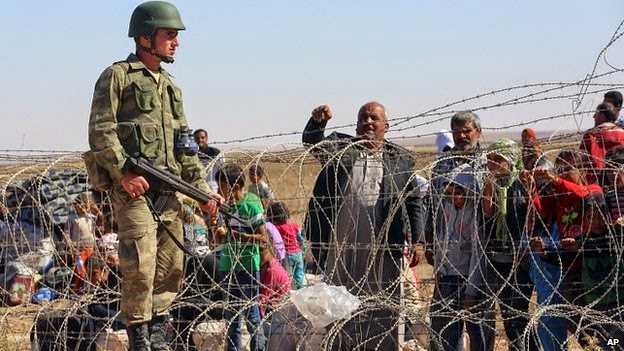Asked during testimony before the Senate Armed Services Committee on Feb. 27 if he was optimistic that Turkey would become “more engaged” in the fight against the Islamic State (IS), US Director of National Intelligence James R. Clapper replied, “No, I’m not. I think Turkey has other priorities and other interests.”
Clapper’s candor, which is reminiscent of Vice President Joe Biden’s “slip” on Oct. 3 that “our biggest problem is our allies” in dealing with foreign fighters in Syria, put the spokespeople at the departments of Defense and State on defense. Asked about Clapper’s remarks, they responded with the usual bromides about Turkey as a “NATO ally” and an “important partner” in the Middle East.
The latest evidence of differing US and Turkish priorities is Turkey’s agreement on Feb. 19 to “train and equip” vetted Syrian rebel forces. The agreement took months to negotiate in part because of Turkey’s insistence that the rebels should be trained to fight the Syrian government, in addition to IS.
And Turkey believes it got what it wanted in the deal last week. Turkish Foreign Minister Mevlut Cavusoglu said on Feb. 23 that he expects that these rebel groups will also fight the Syrian government.
The Pentagon, however, had a different take. In response to a question about the US obligation to opposition forces if they took on the Syrian government, spokesman Rear Adm. John Kirby said on Feb. 27 that “the goal for this program is to get them [Syrian opposition forces] to do those two things: to defend their communities, protect their own neighbors, and then go on the offense against [IS]. The Syria component of this campaign is an anti-[IS] component. That’s the focus, not about the [Bashar al-]Assad regime. [N]othing has changed about … the policy that there’s not going to be a US military solution to Assad.”
Semih Idiz writes from Turkey: “Whatever its merits or demerits, signing the agreement to train and equip moderate members of the Syrian opposition, and then claiming this also targets the Syrian regime — when that is not the intention of the US-led coalition — only reinforces the impression that the government’s Syrian policies, not to mention policies on other regional issues, are in a daze.”
Fehim Tastekin broke the story for Al-Monitor in October 2014 that the pending US-Turkish agreement on “train and equip” would be managed by Turkey’s National Intelligence Organization (MIT), which has been focused on deposing Syrian President Assad, and could give priority to training Syrian Turkmen forces.
Another sign of the impression of a “daze” in Turkey’s Syria policy occurred when a column of dozens of armored vehicles and hundreds of Turkish soldiers entered Syria on Feb. 22 to evacuate 38 Turkish soldiers and the remains of the Tomb of Suleiman Shah. The tomb is recognized as Turkish territory despite being inside Syria.
Despite the martial bravado of the Recep Tayyip Erdogan government, Cengiz Candar writes: “The Turkish military operation is being treated as a matter of indignation or military farce rather than the stunning military success that the government had hoped it would be.”
There was a touch of irony in that the People’s Protection Units (YPG) — the armed branch of the Kurdistan Democratic Union Party (PYD) — helped secure passage for the Turkish column during the operation. It was not long ago that Turkey resisted assistance to Syrian Kurds when they were under attack by IS in Kobani.
Kadri Gursel reports: “History’s joke to Erdogan and his party lies here: Without the joint struggle of the United States and its new regional ally, the PYD, which ousted IS from Kobani, the Turkish tanks would have had no safe route to go and evacuate the tomb.”
Candar cautions that the tomb operation should not be considered a gesture to the PYD and its Turkish affiliate, the Kurdistan Workers Party. To the contrary, he writes that the decision to relocate the tomb just across the Turkish border in Syrian Kurdish territory might be better understood as a “‘strategic’ move to prevent the Kobani canton of the PYD from linking with the Afrin canton farther west to provide a geographic continuity for eventual Kurdish self-rule.”
Source: Al Monitor



